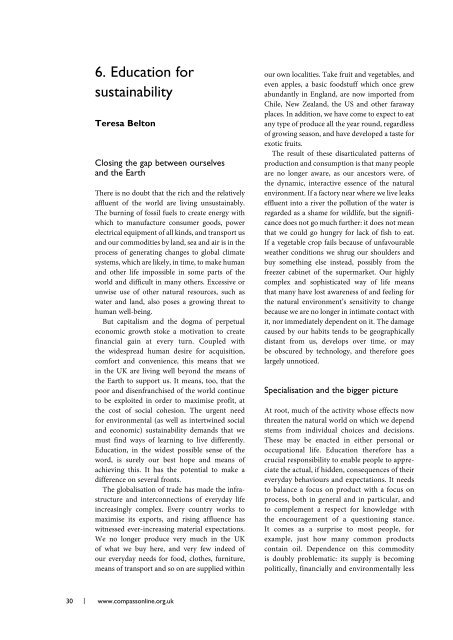EDUCATION FOR THE GOOD SOCIETY - Support
EDUCATION FOR THE GOOD SOCIETY - Support
EDUCATION FOR THE GOOD SOCIETY - Support
You also want an ePaper? Increase the reach of your titles
YUMPU automatically turns print PDFs into web optimized ePapers that Google loves.
6. Education forsustainabilityTeresa BeltonClosing the gap between ourselvesand the EarthThere is no doubt that the rich and the relativelyaffluent of the world are living unsustainably.The burning of fossil fuels to create energy withwhich to manufacture consumer goods, powerelectrical equipment of all kinds, and transport usand our commodities by land, sea and air is in theprocess of generating changes to global climatesystems, which are likely, in time, to make humanand other life impossible in some parts of theworld and difficult in many others. Excessive orunwise use of other natural resources, such aswater and land, also poses a growing threat tohuman well-being.But capitalism and the dogma of perpetualeconomic growth stoke a motivation to createfinancial gain at every turn. Coupled withthe widespread human desire for acquisition,comfort and convenience, this means that wein the UK are living well beyond the means ofthe Earth to support us. It means, too, that thepoor and disenfranchised of the world continueto be exploited in order to maximise profit, atthe cost of social cohesion. The urgent needfor environmental (as well as intertwined socialand economic) sustainability demands that wemust find ways of learning to live differently.Education, in the widest possible sense of theword, is surely our best hope and means ofachieving this. It has the potential to make adifference on several fronts.The globalisation of trade has made the infrastructureand interconnections of everyday lifeincreasingly complex. Every country works tomaximise its exports, and rising affluence haswitnessed ever-increasing material expectations.We no longer produce very much in the UKof what we buy here, and very few indeed ofour everyday needs for food, clothes, furniture,means of transport and so on are supplied withinour own localities. Take fruit and vegetables, andeven apples, a basic foodstuff which once grewabundantly in England, are now imported fromChile, New Zealand, the US and other farawayplaces. In addition, we have come to expect to eatany type of produce all the year round, regardlessof growing season, and have developed a taste forexotic fruits.The result of these disarticulated patterns ofproduction and consumption is that many peopleare no longer aware, as our ancestors were, ofthe dynamic, interactive essence of the naturalenvironment. If a factory near where we live leakseffluent into a river the pollution of the water isregarded as a shame for wildlife, but the significancedoes not go much further: it does not meanthat we could go hungry for lack of fish to eat.If a vegetable crop fails because of unfavourableweather conditions we shrug our shoulders andbuy something else instead, possibly from thefreezer cabinet of the supermarket. Our highlycomplex and sophisticated way of life meansthat many have lost awareness of and feeling forthe natural environment’s sensitivity to changebecause we are no longer in intimate contact withit, nor immediately dependent on it. The damagecaused by our habits tends to be geographicallydistant from us, develops over time, or maybe obscured by technology, and therefore goeslargely unnoticed.Specialisation and the bigger pictureAt root, much of the activity whose effects nowthreaten the natural world on which we dependstems from individual choices and decisions.These may be enacted in either personal oroccupational life. Education therefore has acrucial responsibility to enable people to appreciatethe actual, if hidden, consequences of theireveryday behaviours and expectations. It needsto balance a focus on product with a focus onprocess, both in general and in particular, andto complement a respect for knowledge withthe encouragement of a questioning stance.It comes as a surprise to most people, forexample, just how many common productscontain oil. Dependence on this commodityis doubly problematic: its supply is becomingpolitically, financially and environmentally less30 | www.compassonline.org.uk





![[2012] UKUT 399 (TCC)](https://img.yumpu.com/51352289/1/184x260/2012-ukut-399-tcc.jpg?quality=85)





![Neutral Citation Number: [2009] EWHC 3198 (Ch) Case No: CH ...](https://img.yumpu.com/50120201/1/184x260/neutral-citation-number-2009-ewhc-3198-ch-case-no-ch-.jpg?quality=85)




